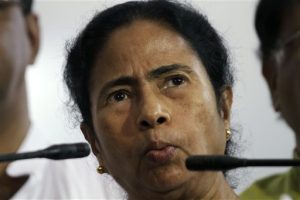Of the five Indian states going to the polls this spring to elect state assemblies, it is the eastern state of West Bengal that is likely to see the most ferocious battles for power.
Elections in the state have always been violent. In the past, it was cadres of the Left Front and the Congress, and following that, of the Left Front and the Trinamool Congress (TMC) that unleashed violence on each other. This time it is the cadres of the two main contenders, the incumbent TMC and the Bharatiya Janata Party (BJP), which helms the federal government, that are at the forefront of violence.
There have been several incidents of stone pelting and even hurling of crude bombs in recent weeks. The West Bengal election has emerged as a no-holds barred battle for power.
The TMC and the BJP have framed their contest in terms of Bengali regionalism and Hindu nationalism, respectively. While the TMC campaign is focusing on Bengali pride and portrays the BJP as an interloper, an “outsider” that has its support base in the Hindi heartland and represents North Indian culture and interests, the BJP is persisting with its aggressive Hindutva rhetoric. Its leaders are targeting the TMC as a party that is anti-Hindu and appeases Muslims.
West Bengal was a communist bastion for decades. The Communist Party of India-Marxist (CPI-M)-led Left Front was in power in the state for an unbroken 34 years. Then in the 2011 elections, the TMC stormed to power, winning 194 seats in the 294-seat state assembly. Not only did it retain power in the 2016 elections but, with 211 seats, improved on its previous performance.
Electoral success has come to the BJP only in recent years in West Bengal. It won its first parliamentary seat from the state in 1998 and entered the West Bengal state assembly for the first time only in 2016.
The party’s electoral performance has improved significantly in recent years. In the 2016 state assembly election, the BJP won three seats and secured roughly 10 percent of votes in the state. Its vote share soared to 40.3 percent in the 2019 general elections, securing it 18 of 42 parliamentary seats from the state. The TMC’s vote share in this election was just 3 percentage points more than that of the BJP.
Although the BJP’s expanding support in the state has not been at the cost of the TMC but of the Left Front, the TMC cannot be complacent. Chief Minister Mamata Banerjee is fighting anti-incumbency sentiment. There is discontent in the TMC. Support for the party is eroding at the grassroots. Corruption scandals have undermined the TMC’s image. Additionally, the BJP has been aggressively poaching on the TMC and several TMC leaders have already jumped ship.
Although Banerjee in targeting several of the BJP’s anti-Muslim policies and laws such as the Citizenship Amendment Act and a proposed National Register of Citizens, Muslims, who constitute almost 30 percent of voters in West Bengal and have been an important part of the TMC’s support base, may not support her in the upcoming election, say analysts. In the recent election to the Bihar assembly, the All India Majlis-e-Ittehadul Muslimeen (AIMIM) attracted many of the Muslim votes, costing anti-BJP parties dearly. The AIMIM is contesting elections in West Bengal now and has joined hands with Peerzada Abbas Siddiqui, the influential head of the Furfura Sharif Dargah in Hooghly district, to form the Indian Secular Front. The ISF could draw the votes of Muslims away from the TMC. A division in Muslim votes would benefit the BJP.
Opinion polls indicate that the TMC will retain power in West Bengal. However, the BJP is expected to make major gains in the assembly elections.
Media coverage of the West Bengal election has largely focused on the TMC-BJP battle. However, the Left Front-Congress alliance could impact the outcome. Should the TMC fall short of a simple majority, the Left Front-Congress alliance, which is expected to win around 30 seats, could play an important role in government formation.

































